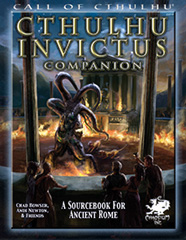
|
About OgreCave and its staff
|

|
by Andy Vetromile
Cthulhu Invictus Companion (2011) For someone who slept through most millennia, dread Cthulhu sure gets his tentacles into a lot of dire historical pies. Now that Rome is an empire, a lot more debauchery has worked its way into the culture. Cultists seek to exploit that, and these organizations and their schemes are at the heart of the Cthulhu Invictus Companion. Chaosium presents three stories of eldritch horror as Rome is threatened, in part or whole, by believers in the power of the Great Old Ones.
Pick Your Poison (with Spoilers)
There are a few new cults and Mythos critters as well. Wep-Wawet is a wolf/man who controls travel through time and space, and the Lords of Abydos are the worshippers guarding his teleportation secrets from opportunistic armies. The hermitic Akeru try to hide a horror from the world, some sort of snake being named Apep, but they may not be able to withhold knowledge of it from the fatalistically curious much longer. Glakki makes undead servants of his very willing acolytes the Teutates, while the Hulden loudly trumpet (ahem) their god Holda's Wild Hunt, a spectral swarm bent on killing those who would attack the weak. The misshapen Vagi follow the Black Wind across the desert as it makes victims of entire towns, and Ba'al Hammon is opposed by the followers of Tanit, who employ the ancient Shining Trapezohedron to foil his plots.
At the Risk of Talking About Artistic "Execution..." The artwork is going to delight some and outrage others. It's an odd, cartoonish brand that some may think looks less than polished and out of place in a tome whose job is to inspire dark fears, but it all has an awkward, caricatured feel that is not only emotive but unsettling. Some will embrace it and others dismiss it. As for the important graphics, there's a mix of good news and bad. Maps are included, of course, but the larger the area they show the less value they have. Most of those are blunt instruments, so don't expect a frameable piece. The location maps should see real use and those are better executed. Like other Chaosium products they're printed both within the adventure and at the back of the book, straddling the keeper's need for convenience and his group's access. The frustrating thing is nothing is labeled as a handout. Illustrations are in order, so that helps, but when the body of the text references, say, "handout 1"? If any of these items is the one in question, you wouldn't know it from looking at it. Most have titles but none of them as a "handout," so one is left to hunt and guess whether the information is on a map or (perhaps) on a sheet not included with this set. Two of these adventures were previously published in another form, so some things might be lost in transition. No mention is made on the cover that it's a reprint, which seems unfair to the buyer. (They came from the Cthulhu Invictus monograph, so now the adventures are part of the companion to the book that was made from the monograph they came from. Don't worry, it gets more confusing in the next paragraph.) You'd think Chaosium would urge folks to pick up the parent sourcebook, but neither Cthulhu Invictus nor the adventure plots are spoken of on the outside. The back copy solely touts the cults, which are only about 15% of the book. Some monsters employed in this book are from the Malleus Monstrorum; that's the sort of thing that ought to be spelled out in a "What You'll Need" section at the front of the book, if not on the cover, but it, too, is right there where the other information isn't.
The Hounds of Tindalos Can Warp Text As Well Each adventure is within a chapter with a different title (i.e., not the name of the story), all except the first adventure – Chuma Invictus! is in a chapter by itself, preceded by another chapter with the cult descriptor. The other adventures are prefaced in their chapters by cult descriptions and/or a Mythos monster, relic, or god... but these don't play a part in the adventure that follows, they merely share geography. Editing errors abound. The first adventure cannot decide if the PCs are guards assigned to the mission or if the players should choose their own connection. Cultarum Galliae is titled simply Cultarum in the book's interior. The table of contents has an incomplete list of subheadings for Cultarum Aegypti and Chuma Invictus!, but at least they enjoy almost two dozen entries between them. The next chapter gets three headings and the last chapter lists only the adventure's title. There's no rhyme or reason to what is included and what gets omitted. To add insult to injury, if this is a repackaged reprint, this was their second time editing it and it still looks amateurish.
Conclusions The low marks are for the lack of attention and overall presentation. It's like getting a new electronic device for your birthday but finding the company omitted the owner's manual: A little common sense tells you what's going on with the Cthulhu Invictus Companion , but you're owed more and better than what's here. This won't prevent a group from enjoying dandy RPG adventures from this underrepresented period of history, but neither do poor editing and construction win favor from customers.
Links:
|
||||
